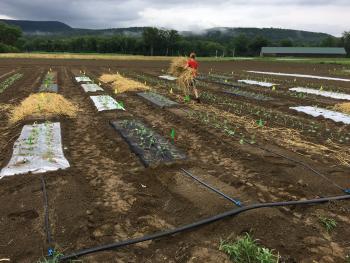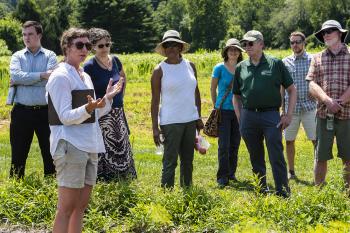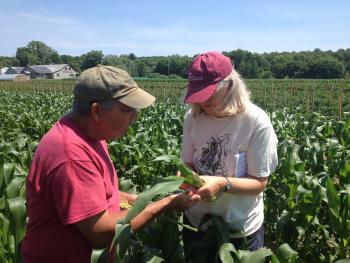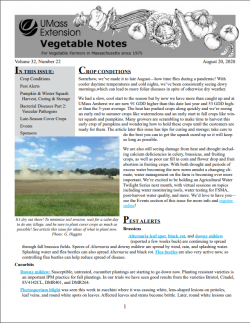About the Vegetable Program

In the late 1860s, the federal government allocated federally controlled land to each state, on which to establish a “land-grant university”. UMass is the land-grant university of Massachusetts. Land-grant universities were given the task of teaching agriculture, engineering, and other applied sciences, and were also given the particular mission of extending their research and teaching into the broader community. This mission was formalized by the Smith-Lever Act of 1914, which established a partnership between the US Department of Agriculture and these agricultural colleges and created the Cooperative Extension Service. Since then, Extension services have provided non-formal education to farmers and other members of the public to help them apply science-based information to real-world issues. As technology advances and needs become more complex, Extension’s role in providing reliable and practical information remains as important as it was 100 years ago.
The UMass Extension Vegetable Team provides both research and educational programs for a diverse and thriving vegetable industry in Massachusetts and the region. The members of the Vegetable Team specialize in various topics related to vegetable production and are available to respond to questions and concerns of commercial vegetable farmers. Whatever your farm size, if you earn your livelihood growing vegetables, please feel free to contact us via our Contact Us page, or contact individual team members on our Faculty and Staff page.
Field Research Trials 
A core part of our program is conducting field research in order to help develop science-based recommendations for crop production issues. Research topics are chosen using feedback from an annual meeting of our advisory panel, made up ofconventional and organic vegetable growers as well as agricultural service providers from across the state. Funding for our research trials comes from many different places, including the New England Vegetable and Berry Growers' Association, state and federal grants, and commercial seed and crop protection companies. Trials are conducted at the UMass Agronomy Research and Education Farm in South Deerfield, MA by UMass Extension Vegetable Program staff. Field trial results are published as articles in our Vegetable Notes newsletter, and as peer-reviewed research reports in Plant Disease Management Reports and Arthropod Management Tests. Results are also presented to growers at an annual Agricultural Field Day event at the Agronomy Research and Education Farm and in grower meetings throughout the year.
Educational Programs 
Another fundamental part of our program is providing educational programming to commercial vegetable growers and agricultural service providers throughout the state and region. These programs include on-farm twilight meetings, trial demonstrations at the UMass Research Farm, classroom-style workshops, and the New England Vegetable and Fruit Conference, which we organize with other New England Extension programs and the New England Vegetable and Berry Growers’ Association. Our upcoming events are listed on our Events page, and we have many recorded webinars available on our Virtual Twilight Meetings page.
Technical Assistance
We are available to provide technical assistance to commercial vegetable growers, both for one-time questions and more in-depth support, on a variety of vegetable crop production topics including soil health and nutrient management, disease and insect pest management, food safety, and more. To ask us a question or request a site visit, please visit our Contact Us or Request a Visit pages.
We provide in-depth, one-on-one Integrated Pest Management technical assistance through our Mentor Farm program. In this program, we work with individual farms to plan and implement IPM practices for specific issues on their farm over 1-3 seasons, with the broader aim to increase the adoption of IPM practices on a diverse range of scales, production systems (conventional or organic) and farm business models across the state. For more information, please see our IPM Mentor Farm Program page.
Pest Scouting Network 
As part of our pest scouting network, every week during the growing season, we travel to farms across Massachusetts to scout, trap, and monitor disease and insect pests of vegetable crops. The information we collect is given to the growers, as well as published each week as ‘Pest Alerts’ in our Vegetable Notes Newsletter, which reaches almost 3,000 subscribers. This program allows us to keep a finger on the pulse of vegetable pest trends over the current season and over many years and get information to growers that will directly impact their pest management decisions.
If you are interested in being a farm in our scouting program, please see our Scouting Network Program page.
Publications 
In addition to fact sheets on crop production issues and research trial reports, we also routinely produce several other publications. We work with other New England Vegetable Extension programs to produce the New England Vegetable Management Guide, which is fully available online and is updated every 2 years. We also publish a newsletter, Vegetable Notes, weekly June through August, and then less frequently in the off-season. Vegetable Notes includes crop condition updates, pest alerts, several timely in-depth articles on crop production topics, as well as relevant news and upcoming events.
The Center for Agriculture, Food and the Environment and UMass Extension are equal opportunity providers and employers, United States Department of Agriculture cooperating. Contact your local Extension office for information on disability accommodations. Contact the State Center Director’s Office if you have concerns related to discrimination, 413-545-4800 or see ag.umass.edu/civil-rights-information.